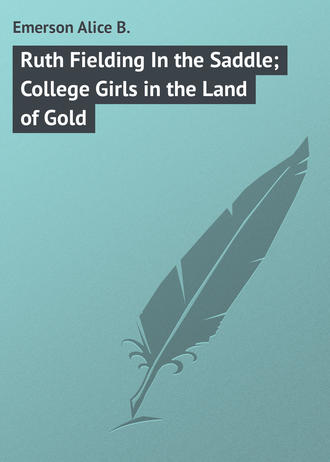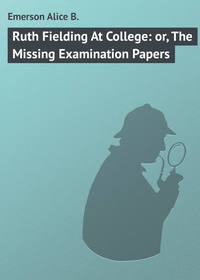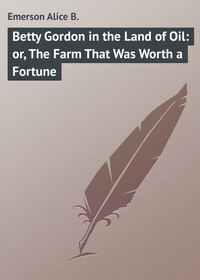 полная версия
полная версияRuth Fielding In the Saddle; College Girls in the Land of Gold
“Oh!” gasped Helen. “Poor old Tommy! If he knew that! He won’t bite you, Rebecca.”
“You girls certainly wouldn’t dream of going on that long journey unless you were properly attended?” cried Rebecca, horrified.
“What do you think we need?” demanded Jennie Stone. “A trained nurse, or a governess?”
Rebecca was thoroughly shocked. “My aunt would never hear of such a proceeding,” she affirmed. “Oh, Ruth Fielding! I want to go with you; but, of course, there must be some older woman with us.”
“Of course – I presume so,” sighed Ruth. “I hadn’t thought that far.”
“Whom shall we ask?” demanded Helen. “Mrs. Murchiston won’t go. She’s struck. She says she is too old to go off with any harum-scarum crowd of school girls again.”
“I like that!” exclaimed Jennie, in a tone that showed she did not like it at all. “We have got past the hobbledehoy age, I should hope.”
Miss Comstock, the senior at their table, had become interested in the affair, and she suggested pleasantly:
“We Ardmores often try to get the unattached members of the faculty to fill the breach in such events as this. Try Miss Cullam.”
“Oh, dear me!” muttered Helen.
Ruth said briskly, “Miss Cullam is just the person. Do you suppose she has her summer free, Miss Comstock?”
“She was saying only last evening that she had made no plans.”
“She shall make ’em at once,” declared Ruth, jumping up and leaving her breakfast. “Excuse me, Miss Comstock. I am going to find Miss Cullam, instantly.”
It was Miss Cullam, too, who had worried most about the lost examination papers which Ruth had been the means of finding (as related in “Ruth Fielding at College”); and the instructor of mathematics had taken a particular interest in the girl of the Red Mill and her personal affairs.
“I haven’t ridden horseback since I was a girl,” she said, in some doubt. “And, my dear! you do not expect me to ride a-straddle as girls do nowadays? Never!”
“Neither will Rebecca,” chuckled Ruth. “But we who have been on the plains before, know that a divided skirt is a blessing to womankind.”
“I do not think I shall need that particular blessing,” Miss Cullam said, rather grimly. “But I believe I will accept your invitation, Ruth Fielding. Though perhaps it is not wise for instructors and pupils to spend their vacations together. The latter are likely to lose their fear of us – ”
“Oh, Miss Cullam! There isn’t one of us who has a particle of fear of you,” laughed Ruth.
“Ahem! that is why some of you do not stand so well in mathematics as you should,” said the teacher dryly.
That was a busy day; but the party Ruth was forming made all their plans, subject, of course, to agreement by their various parents and guardians. In one week they were to meet in New York, prepared to make the long journey by train to Yucca, Arizona, and from that point into the mountains on horseback.
Helen found time for a little private investigation; but it was not until she and Ruth were on the way home to Cheslow in the parlor car that she related her meager discoveries to her chum.
“What did you ever learn about Edie Phelps?” Helen asked.
“Oh! Edie? I had forgotten about her.”
“Well, I didn’t forget. The mystery piques me, as the story writers say,” laughed Helen. “Do you know that her father is an awfully rich man?”
“Why, no. Edith doesn’t make a point of telling everybody perhaps,” returned Ruth, smiling.
“No; she doesn’t. You’ve got to hand it to her for that. But, then, to blow about one’s wealth is about as crude a thing as one can do, isn’t it?”
“Well, what about Edith’s father?” asked Ruth, curiously.
“Nothing particular. Only he is one of our ‘captains of industry’ that the Sunday papers tell about. Makes oodles of money in mines, so I was told. Edith has no mother. She had a brother – ”
“Oh! is he dead?” cried Ruth, with sympathy.
“Perhaps he’d better be. He was rusticated from his college last year. It was quite a scandal. His father disowned him and he disappeared. Edith felt awfully, May says.”
“Too bad,” sighed Ruth.
“Why, of course, it’s too bad,” grumbled Helen. “But that doesn’t help us find out why Edie is so much interested in our going to Yucca; nor how she comes to be in correspondence with anybody in that far, far western town. What do you think it means, Ruthie?”
“I haven’t the least idea,” declared the girl of the Red Mill, shaking her head.
CHAPTER IV – A WEEK AT HOME
Mr. Cameron met the chums en route, and the next morning they arrived at Seven Oaks in time to see Tom receive his diploma from the military and preparatory school. Tom, black-eyed and as handsome in his way as Helen was in hers, seemed to have interest only in Ruth.
“Goodness me! that boy’s got a regular crush on you, Ruthie!” exclaimed Helen, exasperated. “Did you ever see the like?”
“Dear Tom!” sighed Ruth Fielding. “He was the very first friend – of my own age, I mean – that I found in Cheslow when I went there. I have to be good to Tommy, you know.”
“But he’s only a boy!” cried the twin sister, feeling herself to be years older than her brother after spending so many months at college.
“He was born the same day you were,” laughed Ruth.
“That makes no difference. Boys are never as wise or as old as girls – ”
“Until the girls slip along too far. Then they sometimes want to appear young instead of old,” said the girl of the Red Mill practically. “I suppose, in the case of girls who have not struck out for themselves and gone to college or into business or taken up seriously one of the arts, it is so the boys will continue to pay them attentions. Thank goodness, Helen! you and I will be able to paddle our own canoes without depending upon any ‘mere male,’ as Miss Cullam calls them, for our bread and butter.”
“You certainly can paddle your own boat,” Helen returned admiringly, leaving the subject of the “mere male.” “Father says you have become a smart business woman already. He approves of this venture you are going to make in the movies.”
But Uncle Jabez did not approve. Ruth had written to Aunt Alvirah regarding the manner in which she expected to spend the summer, and there was a storm brewing when she reached the Red Mill.
Set upon the bank of the Lumano River, the old red mill with the sprawling, comfortable story-and-a-half farmhouse attached, made a very pretty picture indeed – so pretty that already one of Ruth’s best scenarios had been filmed at the mill and people all over the country were able to see just how beautiful the locality was.
When Ruth got out of the automobile that had brought them all from the Cheslow station and ran up the shaded walk to the porch, a little, hoop-backed old woman came almost running to the door to greet her – a dear old creature with a face like a withered russet apple and very bright, twinkling eyes.
“Oh, my pretty! Oh, my pretty!” Aunt Alvirah cried. “I feared you never would come.”
“Why, Auntie!” Ruth murmured, taking Aunt Alvirah in her arms and leading her back to the low rocking chair by the window where she usually sat.
There was a rosy-cheeked country girl hovering over the supper table, who smiled bashfully at the college girl. Uncle Jabez, as he had promised, had hired somebody to relieve the little old woman of the heaviest of her housekeeping burdens.
“Oh, my back! and oh, my bones!” groaned Aunt Alvirah as she settled back into her chair. “Dear child! how glad we shall be to have you at home, if only for so short a while.”
“What does Uncle Jabez say?” whispered Ruth.
“He don’t approve, Ruthie. You know, he never has approved of your doing things that other gals don’t do.”
“But, Aunt Alvirah, other girls do do them. Can’t he understand that the present generation of girls is different from his mother’s generation?”
Aunt Alvirah wagged her head seriously. “I’m afraid not, my pretty. Jabez Potter ain’t one to l’arn new things easy. You know that.”
Ruth nodded thoughtfully. She expected a scene with the old miller and she was not disappointed. It came after supper – after Uncle Jabez had retired to the sitting-room to count his day’s receipts as usual; and likewise to count the hoard of money he always kept in his cash-box.
Uncle Jabez Potter was of a miserly disposition. Aunt Alvirah often proclaimed that the coming of his grand-niece to the Red Mill had barely saved the old man from becoming utterly bound up in his riches. Sometimes Ruth could scarcely see how he could have become more miserly than he already was.
“No, Niece Ruth, I don’t approve. You knowed I couldn’t approve of no sech doin’s as this you’re attemptin’. It’s bad enough for a gal to waste her money in l’arnin’ more out o’ books than what a man knows. But to go right ahead and do as she plumb pleases with five thousand dollars – or what ye’ve got left of it after goin’ off to college and sech nonsense. No – ”
The miller’s feelings on the subject were too deep for further utterance. Ruth said, firmly:
“You know, Uncle Jabez, the money was given to me to do what I pleased with.”
“Another foolish thing,” snarled Uncle Jabez. “That Miz Parsons had no business to give ye five thousand dollars for gettin’ back her necklace from the Gypsies – a gal like you!”
“But she had offered the reward to anybody who would find it,” Ruth explained patiently.
Uncle Jabez ploughed right through this statement and shook his head like an angry bull. “And then the court had no business givin’ it over to Mister Cameron to take care on’t for ye. I was the proper person to be made your guardeen.”
Ruth had no reply to make to this. She knew well enough that she would never have touched any of the money until she was of age had Uncle Jabez once got his hands upon it.
“The money’s airnin’ ye good int’rest in the Cheslow bank. That’s where it oughter stay. Wastin’ it makin’ them foolish movin’ pictuers – ”
“But, Uncle!” she told him desperately; “you know that my scenarios are earning money. See how much money my ‘Heart of a Schoolgirl’ has made for the building of the new dormitory at Briarwood. And this last picture that Mr. Hammond took here at the mill is bound to sell big.”
“Huh!” grunted the miller, not much impressed. “Mebbe it’s all right for you to spend your spare time writin’ them things; but it ain’t no re’l business. Can’t tell me!”
“But it is a business – a great, money-making business,” sighed Ruth. “And I am determined to have my part in it. It is my chance, Uncle Jabez – my chance to begin something lasting – ”
“Nonsense! Nonsense!” he declared angrily. “Ye’ll lose your money – that’s what ye’ll do. But lemme tell you, young lady, if you do lose it, don’t ye come back here to the Red Mill expectin’ me ter support ye in idleness. For I won’t do it – I won’t do it!” and he stamped away to bed.
The few days she spent at home were busy ones for Ruth Fielding. Naturally, she and Helen had to do some shopping.
“For even if we are bound for the wilds of Arizona, there will be men to see us,” said the black-eyed girl frankly. “And it is the duty of all females to preen their feathers for the males.”
“Just so,” growled her twin. “I expect I shall have to stand with a gun in both hands to keep those wild cowpunchers and miners away from you two when we reach Yucca. I remember how it was at Silver Ranch – and you were only kids then.”
“‘Kids,’ forsooth!” cried his sister. “When will you ever learn to have respect for us, Tommy? Remember we are college girls.”
“Oh! you aren’t likely to let anybody forget that fact,” grumbled Tom, who felt a bit chagrined to think that his sister and her chum had arrived at college a year ahead of him. He would enter Harvard in the fall.
During this busy week, Ruth spent as much time as possible with Aunt Alvirah, for the little old woman showed that she longed for “her pretty’s” company. Uncle Jabez went about with a thundercloud upon his face and disapproval in his every act and word.
Before Saturday a telegram came from Ann Hicks. She had arrived at Silver Ranch, conferred with Uncle Bill, and it was agreed that she should meet Ruth and the other girls at Yucca on the date Ruth had named in her letter. The addition of Ann to the party from the East would make it nine strong, including Miss Cullam as chaperon and Tom Cameron as “courier.”
Tom was to make all the traveling arrangements, and he went on to New York a day before Ruth and Helen started from Cheslow. There he had a small experience which afterward proved to be important. At the time it puzzled him a good deal.
It had been agreed that the party bound for Arizona should meet at the Delorphion Hotel. Therefore, Tom took a taxicab at the Grand Central Terminal for that hostelry. Mr. Cameron had engaged rooms for the whole party by telephone, for he was well known at the Delorphion, and all Tom had to do was to hand the clerk at the desk his card and sign his name with a flourish on the register.
The instant he turned away from the desk to follow the bellhop Tom noted a young man, after a penetrating glance at him, slide along to the register, twirl it around again, and examine the line he, Tom, had written there. The young fellow was a stranger to Tom. He was dressed like a chauffeur. Tom was sure he had never seen the young man before.
“Now, wouldn’t that bother you?” he muttered, eyeing the fellow sharply as he crossed the marble-floored rotunda to the elevators. “Does he think he knows me? Or is he looking for somebody and is putting every new arrival through the third degree?”
He half expected the chauffeur person to follow him to the elevator, and he lingered behind the impatient bellhop for half a minute to give the stranger a chance to accost him if he wished to.
But immediately after the fellow had read Tom’s name on the book, he turned away and went out, without vouchsafing him another glance.
“Funny,” thought Tom Cameron. “Wonder what it means.”
However, as nothing more came of it – at least, not at once – he buried the mystery under the manifold duties of the day. He met a couple of school friends at noon and went to lunch with them; but he returned to the hotel for dinner.
It was then he spied the same chauffeur again. He was helping a young lady out of a private car before the hotel entrance and a porter was going in ahead with two big traveling bags.
Tom was sure it was the same man who had examined the hotel register after he had signed his name; and he was tempted to stop and speak to him. But the young lady whisked into the hotel without his seeing her face, while the chauffeur, after a curious, straight stare at Tom, jumped into the car and started away. Tom noticed that there was a monogram upon the motor-car door, but he did not notice the license number.
“Maybe the girl is one of those going with us,” Tom thought, as he went inside.
The porter with the bags and the young lady in question has disappeared. He went to the desk and asked the clerk if any of his party had arrived and was informed to the contrary.
“Well, it gets me,” ruminated Tom, as he went up to dress for dinner. “I don’t know whether I am the subject of a strange young lady’s attentions, or merely if the chauffeur was curious about me. Guess I won’t say anything to the girls about it. Helen would surely give me the laugh.”
CHAPTER V – THE GIRL IN LOWER FIVE
Tom and his father had visited his sister and Ruth at Ardmore; the young fellow was no stranger to the girls whom Ruth had invited to join the party bound for Freezeout Camp. Of course, Jennie Stone knew Helen’s black-eyed twin from old times when they were children.
“Dear me, how you’ve grown, Tommy!” observed the plump girl, looking Tom over with approval.
“For the first time since I’ve known you, Jennie, I cannot return the compliment,” Tom said seriously.
“Gee!” sighed the erstwhile fat girl, ecstatically, “am I not glad!”
That next day all arrived. Ruth and Helen were the last, they reaching the hotel just before bedtime. But Tom was forever wandering through the foyer and parlors to spy a certain hat and figure that he was sure he should know again. He was tempted to tell Helen and her chums about the chauffeur and the strange young lady while they were all enjoying a late supper.
“However, a man alone, with such a number of girls, has to be mighty careful,” so Tom told himself, “that they don’t get something on him. They’d rig me to death, and I guess Tommy had better keep his tongue between his teeth.”
The train on which the party had obtained reservations left the Pennsylvania Station at ten o’clock in the forenoon. Half an hour before that time Tom came down to the hotel entrance ahead of the girls and instructed the starter to bespeak two taxicabs.
As Tom stepped out of the wide open door he saw the motor-car with the monogram on the door, the same chauffeur driving, and the girl with the “stunning” hat in the tonneau. The car was just moving away from the door and it was but a fleeting glimpse Tom obtained of it and its occupants. They did not even glance at him.
“Guess I was fooling myself after all,” he muttered. “At any rate, I fancy they aren’t so greatly interested. They’re not following us, that’s sure.”
The girls came hurrying down, with Miss Cullam in tow, all carrying their hand baggage. Trunks had gone on ahead, although Ruth had warned them all that, once off the train at Yucca, only the most necessary articles of apparel could be packed into the mountain range.
“Remember, we are dependent upon burros for the transportation of our luggage; and there are only just about so many of the cunning little things in all Arizona. We can’t transport too large a wardrobe.”
“Are the burros as cunning as they say they are?” asked Trix Davenport.
“All of that,” said Tom. “And great singers.”
“Sing? Now you are spoofing!” declared the coxswain of Ardmore’s freshman eight.
“All right. You wait and see. You know what they call ’em out there? Mountain canaries. Wait till you hear a love-lorn burro singing to his mate. Oh, my!”
“The idea!” ejaculated Miss Cullam. “What does the boy mean by ‘love-lorn’?”
It was a hilarious party that alighted from the taxicabs in the station and made its way to the proper part of the trainshed. The sleeping car was a luxurious one, and when the train pulled out and dived into the tunnel under the Hudson (“just like a woodchuck into its hole,” Trix said) they were comfortably established in their seats.
Tom had secured three full sections for the girls. Miss Cullam had Lower Two while Tom himself had Upper Five. There was some slight discussion over this latter section, for the berth under Tom had been reserved for a lady.
“Well, that’s all right,” said Tom philosophically. “If she can stand it, I can. Let the conductor fight it out with her.”
“Perhaps she will want you to sleep out on the observation platform, Tommy,” said Jennie Stone, wickedly. “To be gallant you’d do it, of course?”
“Of course,” said Tom, stoutly. “Far be it from me to add to the burden on the mind of any female person. It strikes me that they are mostly in trouble about something all the time.”
“Oh, oh!” cried Helen. “Villain! Is that the way I’ve brought you up?”
Tom grinned at his sister wickedly. “Somehow your hand must have slipped when you were molding me, Sis. What d’you think?”
When the time came to retire, however, there was no objection made by the lady who had reserved Lower Five. Of course, in these sleeping cars the upper and lower berths were so arranged that they were entirely separate. But in the morning Tom chanced to be coming from his berth just as the lady started down the corridor for the dressing room.
“My!” thought Tom. “That’s some pretty girl. Who – ”
Then he caught a glimpse of her face, just as she turned it hastily from him. He had seen it once before – just as a certain motor-car was drawing away from the front of the Delorphion Hotel.
“No use talking,” he thought. “I’ve got to take somebody into my confidence about this girl. To keep such a mystery to myself is likely to affect my brain. Humph! I’ll tell Ruth. She can keep a secret – if she wants to,” and he went off whistling to the men’s lavatory at the other end of the car.
Later he found Ruth on the observation platform. They were alone there for some time and Tom took her into his confidence.
“Don’t tell Helen, now,” he urged. “She’ll only rig me. And I’m bound to have a bad enough time with all you girls, as it is.”
“Poor boy,” Ruth said, commiseratingly. “You are in for a bad time, aren’t you? What about this strange and mysterious female in Lower Five?”
But as he related the details of the mystery, about the chauffeur and all, Ruth grew rather grave.
“As we go through to the dining car for breakfast let us see if we can establish her identity,” she told him. “Never mind saying anything to the other girls about it. Just point her out to me.”
“Say! I’m not likely to spread the matter broadcast,” retorted Tom. “Only I am curious.”
So was Ruth. But she bided her time and sharply scrutinized every female figure she saw in the cars as they trooped through to breakfast. She waited for Tom to point out this “mysterious lady;” but the girl of Lower Five did not appear.
The train was rushing across the prairies in mid-forenoon when Tom came suddenly to Ruth and gave her a look that she knew meant “Follow me.” When she got up Jennie drawled:
“Now, see here, Ruthie! What’s going on between that perfectly splendid brother of Cameron’s and you? Are you trying to make the rest of us girls jealous?”
“Perhaps,” Ruth replied, smiling, then hurried with her chum’s brother into the next car.
“Oh!” exclaimed Ruth suddenly, and she stopped by the door.
“Know her?” asked Tom, with curiosity.
Ruth nodded and hastily turned away so that the girl might not see that she was observed.
“Well, now!” cried Tom. “Tip me off. Explain – elucidate – make clear. I’m as puzzled as I can be.”
“So am I, Tommy,” Ruth told him. “I haven’t the least idea why that girl should be interested in our affairs. And I’m not sure that she is.”
“Who is she?” he demanded.
“She goes to college with us. Not in our class, you understand. I am sure none of our party had an idea Edie Phelps was going West this vacation.”
“Huh!” said Tom suspiciously. “What’s up your sleeve, Ruth?”
“My arm!” she cried, and ran back to the other girls and Miss Cullam, laughing at him.
Edith’s presence on this train was puzzling.
“That was a man’s handwriting on the envelope Helen and I picked up addressed to Edith,” Ruth told herself. “Some man has been writing to her from that Mohave County town. Who? And what for?”
“Not that it is really any of my business,” she concluded.
She did not take Helen into her confidence in the matter. Let the other girls see Edith Phelps if they chanced to; she determined to stir up no “hurrah” over the sophomore.
Besides, it was not at all sure that Edith was going to Arizona. Her presence upon this train did not prove that her journey West had any connection with the letter Edith had received from Yucca.
“Why so serious, honey?” asked Helen a little later, pinching her chum’s arm.
“This is a serious world, my dear,” quoth Ruth, “and we are growing older every minute.”
“What novel ideas you do have,” gibed her chum, big-eyed. But she shook her a little, too. “There you go, Ruthie Fielding! Always having some secret from your owniest own chum.”
“How do you know I have a secret?” smiled Ruth.
“Because of the two little lines that grow deeper in your forehead when you are puzzled or troubled,” Helen told her, rather wickedly. “Sure sign you’ll be married twice, honey.”
“Don’t suggest such horrid possibilities,” gasped the girl of the Red Mill in mock horror. “Married twice, indeed! And I thought we had both given up all intention of being wedded even the first time?”
This chaff was all right to throw in Helen’s eyes; but all the time Ruth expected one of the party to discover the presence of Edith Phelps on the train. She felt that with such discovery there would come an explosion of some kind; and she shrank from having any trouble with the sophomore.









